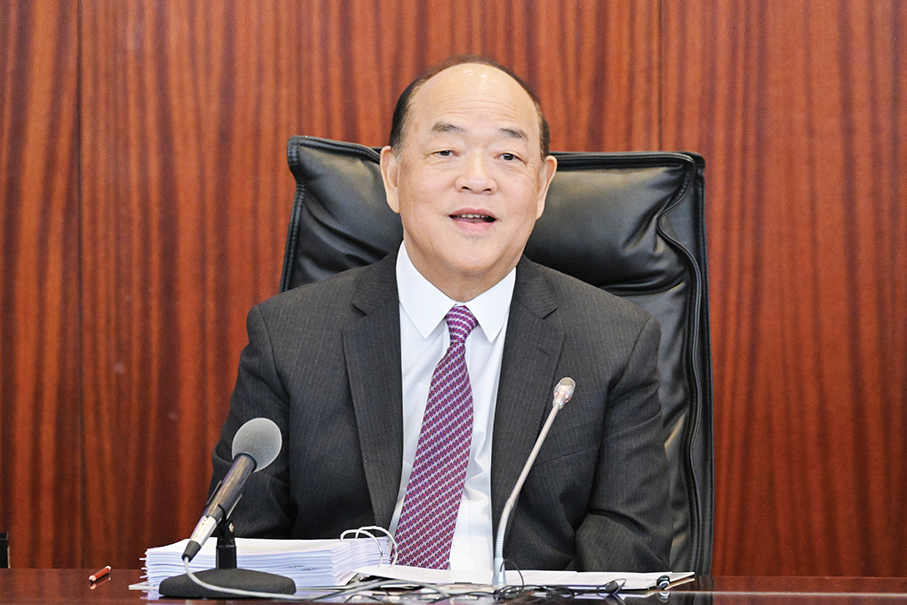Chief Executive Ho Iat Seng said yesterday that Macau’s civil society “can” strengthen its patriotic education campaign in compliance with the essence and spirit of the nation’s newly-enacted Patriotic Education Law, despite the fact that the new law will not be formally implemented in the Macau Special Administrative Region (MSAR) as it is not included in the MSAR Basic Law’s Annex 3 which lists the national laws, resolutions and regulations applied here.
The chief executive also noted that Macau has a long-standing “good tradition” of carrying out patriotic education campaigns.
The nation’s Patriotic Education Law, which was passed by the Standing Committee of the National People’s Congress (NPC) in Beijing last month, will take effect on January 1 next year.
According to Article 18 of the MSAR Basic Law, national laws shall not be applied in the MSAR except for those listed in its Annex 3.
Ho made the remarks during a Q&A session in the legislature’s hemicycle yesterday afternoon. The chief executive attended the 3.5-hour session, which was held a day after he delivered his two-hour 2024 Policy Address, to answer questions from 31 lawmakers in the 33-member Legislative Assembly (AL) headed by Kou Hoi In.
When delivering his 2024 Policy Address in the legislature’s hemicycle on Tuesday, Ho said that the local government will continue to strengthen its patriotic education campaign such as by deepening its understanding of the country’s new Patriotic Education Law.
While the new Patriotic Education Law will only be applied in the mainland, it has an article mentioning the nation’s two special administrative regions of Hong Kong and Macau. According to the law’s Article 23, the state will adopt measures to carry out history and cultural education as well as education on the practice of the “One Country, Two Systems” principle, enhancing patriotism among compatriots from the Hong Kong Special Administrative Region (HKSAR) and the MSAR with the aim of boosting their awareness of safeguarding national sovereignty, unity and territorial integrity.
During yesterday’s Q&A session, indirectly-elected-lawmaker-cum-banker Alan Ho Ion Sang asked the chief executive whether the local government will draw up new guidelines on launching patriotic education campaigns for Macau’s civil society in compliance with the essence and spirit of the nation’s new Patriotic Education Law.
In reply, Ho pointed out that the nation’s new Patriotic Education Law is not among the various national laws listed by the MSAR Basic Law’s Annex 3, because of which it will not be applicable in Macau.
However, Ho said, various segments of Macau’s civil society such as schools, community associations and other organisations “can” apply the new law’s essence and spirit to their respective patriotic education campaigns.
Ho also underlined that the city’s schools and higher education institutions have all been intensively carrying out patriotic education for their students, which includes teaching them about the nation’s Constitution, the MSAR Basic Law and the local national security law.
Special public bus routes to serve LRT Barra station
Meanwhile, Ho said yesterday that after the Light Rail Transit (LRT) Taipa-Barra section opens next month, special public bus routes will be operated connecting the Barra Public Transport Interchange, which is located next to the LRT Barra station, with the Barrier Gate border checkpoint and the Outer Harbour Ferry Terminal.
Ho also underlined that the government is aiming for both the LRT Seac Pai Van section and the Cotai-Hengqin section to open next year.
Ho said that with more new LRT lines to open in the future, the government will adopt a public transport interchange model making it easier for passengers to transfer between the LRT and public bus services.
Ho also said that the government will also study the possibility of building covered elevated walkways in certain neighbourhoods with the aim of making it easier for residents to travel on the LRT.
For instance, Ho said, the government is studying the possibility of extending the elevated walkway project along Avenida do Nordeste in the peninsula’s Areia Preta district, the construction of which is slated to start next year, to future nearby stations of the ongoing LRT East Line project.
Two stations of the LRT East Line, the construction of which is scheduled to be completed in 2028, will be located at the peninsula’s north-eastern coast.
Ho rules out new round of consumption smartcards
Meanwhile, Ho also ruled out the possibility of rolling out a new e-consumption benefit scheme as otherwise the government would face a budget deficit next year.
Ho said that the government expects to run a small surplus in its 2024 budget bill, which proposes to again inject 7,000 patacas into the Central Provident Fund accounts of every eligible permanent resident next year.
Consequently, according to Ho, next year’s budget would be in the red if the government decided to launch a new round of e-consumption benefit scheme.
Several rounds of the scheme were run during the COVID-19 pandemic between 2020 and 2022, amounting to 8,000 patacas for local residents each time.

Chief Executive Ho Iat Seng answers questions from lawmakers during yesterday’s Q&A session about his 2024 Policy Address in the Legislative Assembly’s (AL) hemicycle. – Photo: GCS






